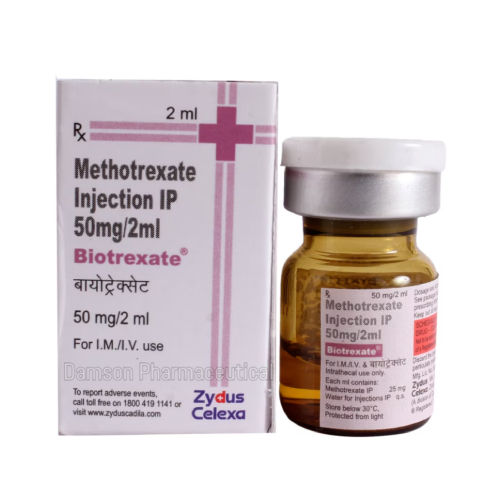Methotrexate Injection
Methotrexate Injection Trade Information
- Supply Ability
- 100 Bottles, Per Week
- Delivery Time
- 1 Week
About Methotrexate Injection
Methothrexate:-
Methotrexate is used to treat severe psoriasis (a skin disease in which red, scaly patches form on some areas of the body) that cannot be controlled by other treatments. Methotrexate is also used along with rest, physical therapy and sometimes other medications to treat severe active rheumatoid arthritis (RA; a condition in which the body attacks its own joints, causing pain, swelling, and loss of function) that cannot be controlled by certain other medications. Methotrexate is also used to treat certain types of cancer including cancers that begin in the tissues that form around a fertilized egg in the uterus, breast cancer, lung cancer, certain cancers of the head and neck, certain types of lymphoma, and leukemia (cancer that begins in the white blood cells). Methotrexate is in a class of medications called antimetabolites. Methotrexate treats cancer by slowing the growth of cancer cells. Methotrexate treats psoriasis by slowing the growth of skin cells to stop scales from forming. Methotrexate may treat rheumatoid arthritis by decreasing the activity of the immune system.
How should this medicine be used?Methotrexate comes as a tablet to take by mouth. Your doctor will tell you how often you should take methotrexate. The schedule depends on the condition you have and on how your body responds to the medication.
Your doctor may tell you to take methotrexate on a rotating schedule that alternates several days when you take methotrexate with several days or weeks when you do not take the medication. Follow these directions carefully and ask your doctor or pharmacist if you do not know when to take your medication.
If you are taking methotrexate to treat psoriasis or rheumatoid arthritis, your doctor may tell you to take the medication once a week. Pay close attention to your doctor's directions. Some people who mistakenly took methotrexate once daily instead of once weekly experienced very severe side effects or died.
Follow the directions on your prescription label carefully, and ask your doctor or pharmacist to explain any part you do not understand. Take methotrexate exactly as directed. Do not take more or less of it or take it more often than prescribed by your doctor.
If you are taking methotrexate to treat psoriasis or rheumatoid arthritis, your doctor may start you on a low dose of the medication and gradually increase your dose. Follow these directions carefully.
Methotrexate may cause very serious side effects. Some side effects of methotrexate may cause death. You should only take methotrexate to treat life-threatening cancer, or certain other conditions that are very severe and that cannot be treated with other medications. Talk to your doctor about the risks of taking methotrexate for your condition.
Tell your doctor if you have or have ever had excess fluid in your stomach area or in the space around your lungs and if you have or have ever had kidney disease. Also tell your doctor if you are taking nonsteroidal anti-inflammatory drugs (NSAID) such as choline magnesium trisalicylate (Tricosal, Trilisate), ibuprofen (Advil, Motrin), magnesium salicylate (Doan's), naproxen (Aleve), or salsalate. These conditions and medications may increase the risk that you will develop serious side effects of methotrexate. Your doctor will monitor you more carefully and may need to give you a lower dose of methotrexate or stop your treatment with methotrexate.
Methotrexate may cause a decrease in the number of blood cells made by your bone marrow. Tell your doctor if you have or have ever had a low number of any type of blood cells or any other problem with your blood cells. Your doctor may tell you not to take methotrexate unless you have life-threatening cancer.

Price 2 INR/ Bottle
- Minimum Order Quantity
- as per requirement Bottle
- Supply Ability
- 100 Bottles, Per Week
- Delivery Time
- 1 Week

Price:
- 50
- 100
- 200
- 250
- 500
- 1000+
More Products in Oncology Drugs Category
Botulinum Toxin A Injection
Origin : Biotechnologically Derived
Storage Instructions : Store in Refrigerator (2C 8C), Protect from Light
Fermentation Smell : Other, Odorless
Dosage Form : Lyophilized Powder for Injection
Shelf Life : 36 Months (Unreconstituted)
Ingredients : Other , Botulinum Toxin A, Human Serum Albumin, Sodium Chloride
Albumin Injection
Origin : Human Plasma Derived
Storage Instructions : Store below 25C, Do not freeze, Protect from light
Fermentation Smell : Other, Odorless
Dosage Form : Injection
Shelf Life : 3 Years
Ingredients : Other , Albumin (Human) Solution, Sodium Caprylate, Sodium Chloride, Water for Injection
Entecavir Tablets
Origin : Pharmaceutical
Storage Instructions : Store below 30C in a dry place, protect from light
Fermentation Smell : Other, Odorless
Dosage Form : Tablet
Ingredients : Other , Entecavir Monohydrate, Excipients
Rabipur Injection
Origin : Biological/Vaccine
Storage Instructions : Store at 2C to 8C; do not freeze
Fermentation Smell : Other, Odorless
Dosage Form : Injection
Shelf Life : Usually 24 months if properly stored
&
We are accepting bulk order quantity.







